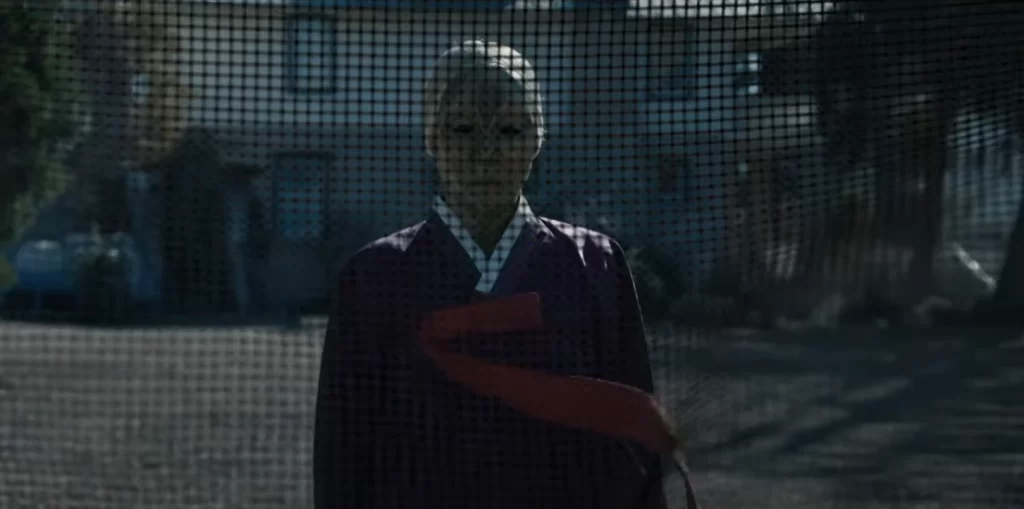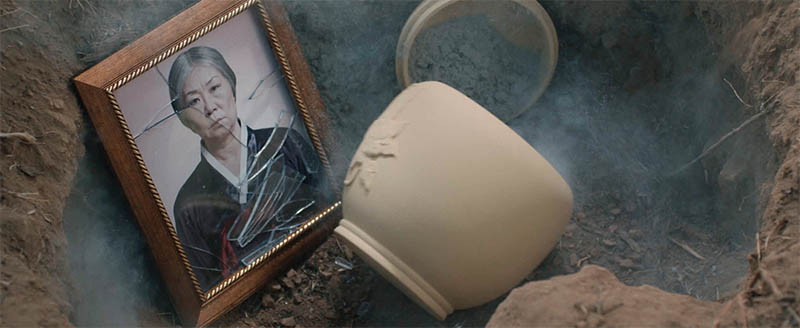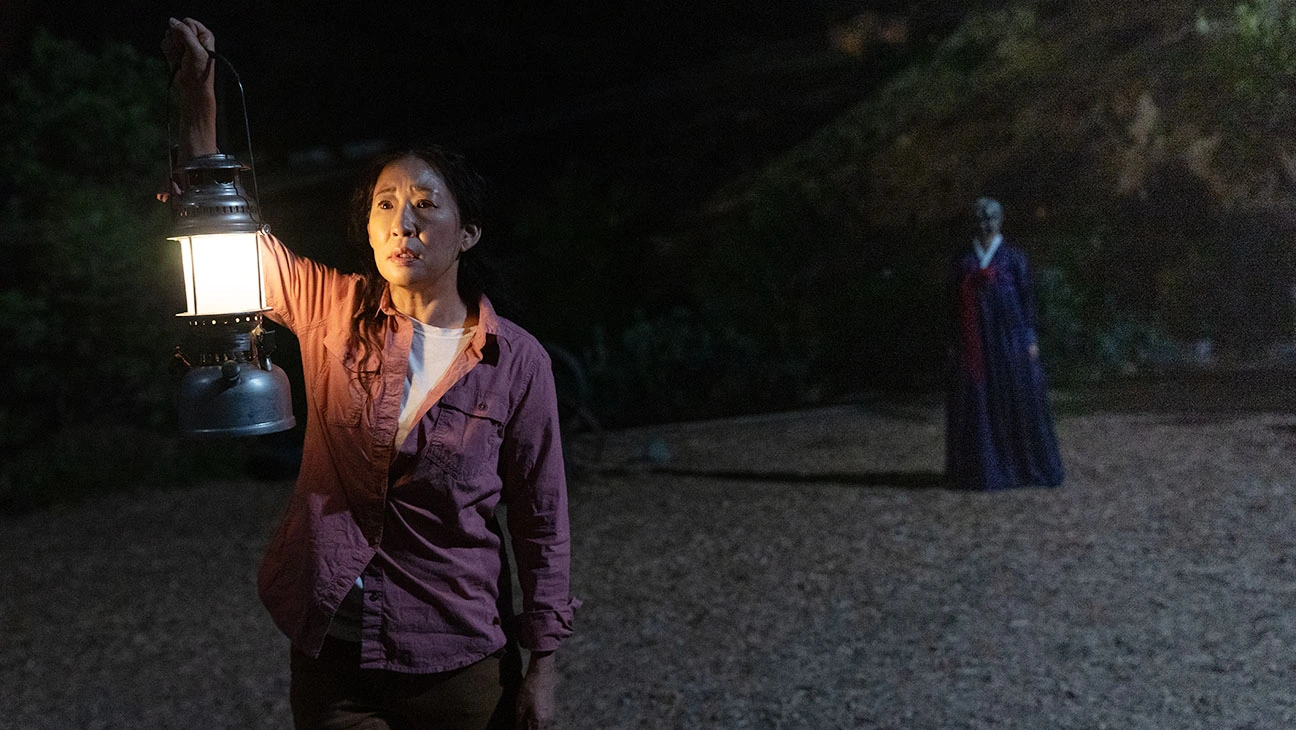Movie Umma’s Confounding Ending Explained. Sandra Oh. (Killing Eve?) She sold this movie to me beginning to end. It was her involvement that guaranteed to me that Umma was going to be a different kind of horror movie. I knew that she wouldn’t sign up for a film that was all senseless chainsaws and meat hooks. That just wouldn’t make any sense whatsoever. And literally? That is what happened. Umma is a thought-provoking sort of film. A film dealing with generational pain, and what happens when we are trapped in this sort of endless cycle of chaos. It is a really good story about Korea, but it is a really great story about us, our families, and our family’s hidden pain. I thought so anyway.
Haven’t seen Umma yet? Don’t continue on… watch it first. Trust me.
Umma Movie Walkthrough
The movie opens years later, and Amanda, a Korean immigrant who is dealing with terrible nightmares for some odd reason. Electrical cables glowing in the dark. Screams. None of it is good. Cut backwards in time, and see that Amanda and her daughter Chris live out on a farm raising bees and honey. It’s pretty clear that Amanda is not keen on Chris’ desire to leave the farm and go to college. We quickly realize that Amanda is living a tech-free life. No phones, no watches, no internet. All paper, pens, and the like. Why? Because Amanda has some sort of technological-allergy. She can’t be near electricity. Amanda’s uncle arrives from halfway around the world and upsets the balance of things. How? Simple enough, he brings the cremated remains of Amanda’s recently deceased mother, who Amanda hasn’t spoken to for years. In so doing, he has unleashed a ton of memories of Amanda’s terrible, and abused childhood.
As Amanda’s backstory unfolds, we start realizing that Amanda’s mother, Umma, raised Amanda on her own, and regularly Amanda was electrocuted by her mother as a punishment for being bad. Thus her “allergy” to electricity and electronics. When Amanda bailed on her abusive mother, she also cut all ties to her Korean background as well… the language, the heritage, as well as her family name. When her visit with her uncle comes to an end, he belittles Amanda for abandoning her mother, worse, for not teaching Chris about her family, the language, and the culture. Hrmm. Seems like something deeper is going on here.
As with all horror movies – Amanda screwed up big time to let the cremated remains come across the threshold of her home. Bad juju. Because, soon after arriving, an evil spirit appears and it is hell-bent on taking Amanda for itself. “With her dying breath, she reached out to you by saying your name… like you were right there beside her.” This tormented spirit (kumiho) is seen about the premises. It is even seen eating her chickens. And Amanda realizes, she might be becoming her mother. Worse, Umma’s spirit possesses her daughter after Amanda attempts to bury Umma’s ashes.

Then later, Chris comes unglued when her mother doesn’t believe any of this is really happening. But what Chris didn’t know was that Amanda was also possessed by Umma’s spirit when she also attempted to bury Umma’s urn and her possessions. Eventually Chris figured it all out, and started running for it only to witness the chickens being devoured by a Kumiho (demon fox) which comes from Korean lore. And with that, a possessed Amanda attacks Chris and tries to kill her for trying to leave her, and heading off to college. Yeah, talk about disproportional. I have a kid or three interested in going off to college, but I haven’t once considered attempting to kill them!
When Chris finds her mother conducting a Jesa (A Jesa is sort of a ceremony practiced in Korea for the memorial of ancestors. Usually a Jesa is performed on anniversaries of their death.) and wearing her mother’s mask, and hanbok (A hanbok is traditional Korean clothes… which, literally means “Korean clothing” apparently. But these particular clothes can be traced backwards to the Three Kingdoms period of Korea.) Umma attacks Amanda. Guess Umma wasn’t too excited about Amanda’s attempt to mollify her. Amanda’s only salvation was her pleading for her life. And in that moment, Amanda realizes the only way to deal with this evil. And this is a really interesting detail… Amanda forgives Umma for abusing her. She tells Umma that it was unfair for her to be expected to raise her in a new world and without any sort of help. It’s an interesting pivot for a horror movie. And I am always a sucker for this right hook. Why? Because the standard blueprint for a horror movie is to “avenge” the wrong, and wipe the planet clean of the evil’s existence. But it literally perpetuates the evil, just shifting it from one hopping foot to another. It literally makes no sense. But forgiving? That is the real dark magic.
It is this compassion, this forgiveness, this understanding, that ultimately allows Umma to finally move on. It wasn’t the masks, the traditional dress, the rituals. It was acceptance and forgiveness. And as the movie ends, we watch as Amanda rediscovers her family’s deep heritage, and the beauty of the Korean way of thinking and acting. And I have to say, it was during one trip to Korea… as we were at dinner and I watched as half the restaurant was sitting on the floor (“Why would you choose to sit on the floor when tables and chairs are 20 feet away?” “Because it reminds us of the coziness of our childhood, our heritage, our homes… as we sit on the warm floor (the floors are heated) and ate traditional meals.”) … I didn’t get it myself (especially when they brought out the red bean ice cream… I swear to god… they did.) but I appreciated their appreciating it. It’s beautiful. And the real coup d’état? Was when Amanda began sharing her family’s heritage with Chris. That is the moment we know that real change had taken root. Better yet, she understood that Chris also needed to live her own life. I mean… change and epiphanies are raining from the ceiling! They are everywhere!!

Ending of the Movie Umma Explained
“Some Koreans believe that life’s hardships are caused by the tormented spirits of their ancestors, so they make offerings to appease their ancestor’s tortured souls.”
I KNEW that a horror movie, signed on by Sandra Oh, would be an inside out sort of affair. It wouldn’t be all chainsaws, and pick axes. That’s just not how it was going to go. Instead it was a much deeper, more thoughtful sort of event. It was a film steeped in tradition, learning, and epiphany. It was a story that was here to tell us about the possible horrors of traditional Korean culture, and that regardless of how terrific, they were all forgivable. In fact, literally the only way to turn the corner of the past is to forgive. To let go. To realize that the perpetrator had their own terrors inflicted on them… and that they too were demonized by their own troubles.
The key twist was when Chris appealed to her mother’s love – begging for her mother to help. It was the mother and the daughter that worked together to unlocked the puzzle helping them to ultimately survive. It was this moment, between daughter and mother, that unlocked the insanity blocking her vision and helped her to really see what was happening. And it was in this moment that Amanda knew she had to face her mother, to face the past trauma, to finally deal with the deeper psychological landmines. And that was when Amanda was transported to a spiritual plane to have the final boss battle with her mother. She could only encounter the trauma in the burial chamber… the pit. Which is why she went into this burial hole to arrive in this spiritual plane. And it was only through recalling the moments of sentiment, passion, and love that she was able to overcome the darkness and death. Amanda was able to communicate how she understood the difficulties of her mother’s past, and it was through the shared love and memories in and around their experience with the music box that they were ultimately able to spiritually connect and find peace.
Edited by: CY



